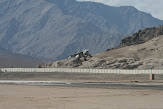In continuation as a sequel to my earlier article titled “Why I feel that Gorkhaland is not possible in the near future. – Part 1”
As I have already mentioned, the prospects of the centre taking the demand for separate state of Gorkhaland to its logical conclusion, seems rather bleak for now. One can understand the compulsion that the center is in considering the fact that there are more than a dozen such demands currently being raised in India for various reasons. What we need to do now is to focus on a long term strategy to build a gradual case for the creation of a separate state. Considering the size of the envisaged new state, it would be logical that even if new states are indeed formed in India, the inclusion of Gorkhaland in the group of new states may not be fruitful.
For Gorkhaland to be eventually realized there are two things that need to be done,
1. Firstly, separate the ‘Gorkhaland’ issue from other such demands in the country and maintain it as an exclusive case, like one enjoyed by the North Eastern states.
2. Secondly, go for a step by step approach so that the Central Govt is constitutionally, obliged to grant a separate state.
For this, what we need is to analyze the correct political atmosphere, see how much is the center and the state willing to go to satisfy the demand. This requires building extra pressure on both the state govt as well as the center by way of non-cooperation and home rule. Make the pressure such that the govt is forced to take a stand on it. However, there is a limit upto which such agitation can be taken. Going over-board would invite deployment of para-military forces and a ruthless attempt to crush the movement. This would be detrimental to both the democratic movement, as well as the people participating in it. We need to understand that in such case, it is better to put pressure on the state govt, as it will have more compulsion to act, keeping in mind the public attention it would get in the state. However we must maintain the upper hand in terms of calling on and off the movement rather than being compelled to sit for negotiation out of necessity.
The state govt in the start of the Gorkhaland Agitation in 2008, had publicly announced that they were willing to give more power to the Sixth-schedule and increase its area to beyond the present hill sub-divisions. Similar offer once made by the state govt should be accepted as a last resort, while still insisting on the statehood demand, this will give us the leeway for us to demand a more respectable form of Sixth-schedule with more legislative and executive powers as enjoyed by the likes of Bodoland Territorial Council. Another thing to add would be to bring the Council under the banner of the North-Eastern Development Council. This is a much more realistic possibility, as the Center and the state have in-fact endorsed the Sixth-schedule imposition in the Darjeeling Hills, what was lacking in the proposed Sixth-schedule legislature was the comprehensive powers for it to be an accountable and credible alternative to satisfy the various socio-economic problems being faced by the people of the hills. Once the required aberrations are cleared out and newer areas included to its responsibility, the current economic problems can be solved and the region and the people can benefit from the development, for the immediate future.
This will lead to realizing two aspects,
1. The implementation of Sixth-schedule and inclusion of the same in the North-Eastern council would make the Gorkhaland demand exclusive of other similar demands being made in the country. This would ensure, that Gorkhaland demand is looked as any other issues in the North East would be dealt with, which is preferential as compared to other such demands in the rest of the country.
2. The implementation of Sixth-schedule would lead to the de-facto acceptance of Darjeeling as a separate entity within West Bengal, a term like State within a state. This would more or less oblige the center to give Darjeeling the statehood status on a later date, as the logical conclusion of Sixth-schedule as is seen with other similar cases in the North-East like Mizoram and Meghalaya, which were changed to states from being Autonomous Councils.
This would have major implications, one being that it would take lot more years to achieve the real goal of statehood, and the loss of trust from the people because of what we achieved previously from the infamous D.G.H.C. The positive aspect of it would be we would be assured of a separate state someday. The immediate agitation for a separate state either way could be long. Other such popular demands fail because, pro-longed dragging of the movement causes serious economic harship among the people of the region. Being pro-longed the people lack focus of the agitation, thus giving rise to un-scrupulous elements that play havoc with not only the general populace but also the economic resources of the region.
Implementation of the Sixth-schedule for the short term would thus solve some of the severe economic problems plaguing the region, and help people move forward to a better economic and social condition. At the same time, the Autonomous council and the region in it will get the necessary constitutional guarantee for qualifying as a separate state, which no other region in India outside the North East can get. Once the economic woes of the people are met, proper resources and ideas can be utilized in achieving the goal of statehood by means of legitimate constitutional guarantees. Thus, if we take a long term approach, this will help us in achieving the long cherished dream of a separate state for the people in the region.
The formation of a separate state in India is a major issue for the country. It has serious implications for the concerned region as well as the rest of the country. It has to be made by the Government in the national interest and not under compulsion by a mere segment of population of a region. Considering these logical reasons, it would be appropriate to take a serious approach. An in depth long term planning is necessary for us to achieve the logical conclusion. One that has constitutional and legal legitimacy. Being a small region with small population, political power alone cannot guarantee us a separate state, thus we need to use the correct privileges and powers that have been guaranteed to our community and region by the Constitution. We might find the process long, but the possibility of our dream coming true at minimum economic and social loss is the benefit that can offset any time overruns in the future.
Wednesday, March 25, 2009
Why I feel that Gorkhaland is not possible in the near future. – Part 2”
Posted by Anant Dhamala at 10:09 AM
Subscribe to:
Post Comments (Atom)










1 Comment:
Very well thought of ..and logical...well researched on...very well written...bottomline...great Job!
Post a Comment